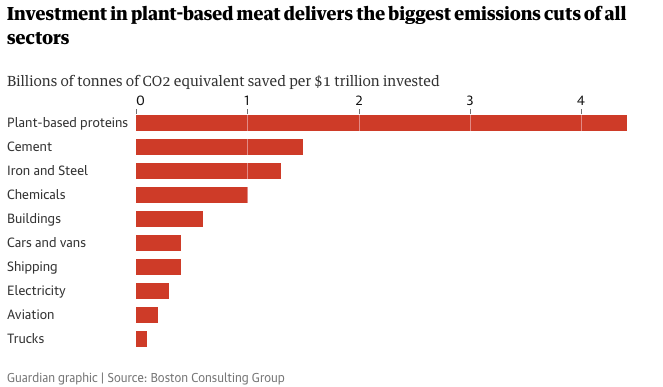Better Bioeconomy Weekly - Feb 20th 2023 🌏
2022 was APAC alternative protein’s best funding year, yet
WORD BUFFET 📖
2022 was APAC alternative protein’s best funding year yet 💰📈
Plant-based food investments increased by 30%, from $287 million to $372 million.
Fermentation investments increased by 67%, from $57 million to $95 million.
Cultivated investments increased by 96%, from $48 million to $95 million.
Total APAC alternative protein investments increased by 43%, from $392 million to $562 million.
60% of restaurant operators see plant-based options as a long-term trend 👨🏾🍳🌱
Nearly half of all US restaurants currently offer plant-based alternatives, with trend-forward restaurants most likely to offer plant-based options.
Price and taste are still the biggest concerns for plant-based meat consumers, with 40% of consumers worried about not being satisfied with the taste of the alternative meat.
Plant-based dairy is showing strong growth across all types of products, with dairy-free menu offerings up over 20% across all restaurant segments.
Alternative protein Is the best investment to tackle climate change 🌏📈
Investment in alternative meat and dairy alternatives could result in 3x more GHG reductions compared to investment in green cement technology, 7x more than green buildings, and 11x more than zero-emission cars.
Alternative proteins are expected to make up 11% of total protein consumption by 2035, but this number could increase to 22% with support from technology, investment, and regulation.
A market share of 11% for alternative proteins by 2035 could result in a reduction of 0.85 gigatons of CO2 equivalent (CO2e) worldwide, which is equivalent to decarbonizing 95% of the aviation industry.
China’s first cultivated meat pilot factory 🇨🇳
CellX and Tofflon are partnering to develop the first cultivated meat pilot plant in mainland China.
Tofflon is custom-building bioreactors to suit CellX's bioprocess, allowing for a thousand-litre scale of serum-free media suspension lines.
The facility will offer consumer tasting space and be home to multiple 1000L bioreactors.
Lack of fermentation facilities is a major bottleneck for the bioeconomy 🌏📉
While billions of dollars have flowed to precision and biomass fermentation companies in recent years, achieving commercial adoption requires a network of large-scale infrastructure
Most available fermentation facilities are bench-scale or pilot-scale, while demo-scale and commercial-scale facilities are lacking
There is less capacity in APAC compared to Europe and the Americas, but the region is expected to grow as biomanufacturing becomes more mature
ESG will have a bumpy 2023 but sustainability will be alright ⬆️⬇️
Two forms of backlash in ESG investment community: "anti-woke" movement and skeptics questioning outperformance of ESG funds.
Sustainability is essential for business success and companies must go beyond ESG questionnaires.
Companies must focus on zero carbon emissions, human rights in supply chains, and innovating sustainable products.
Engaging employees and stakeholders, partnering with peers, and more will be crucial for a successful sustainability strategy.
SCROLL FEAST 📱
No such thing as sustainable dairy 🥛🧀
US dairy consumption per capita is increasing, driven by cheese and yogurt
Fluid milk consumption is decreasing
Dairy production has significant environmental impacts, including carbon and methane emissions, biodiversity loss, deforestation, soil depletion, and antibiotic resistance
Dairy production also requires intensive water and pesticide/fertilizer use, and can lead to unintentional hormone intake.
Also, no such thing as sustainable beef 🐮🥩
Producing beef requires a lot of land, with 1/3 of the ice-free land mass on the planet dedicated to grazing and feeding livestock.
Beef requires a lot of water, with agriculture using 70% of all freshwater on Earth and cattle being the leading user of water in some places.
Beef produces a lot of emissions, particularly methane which is 84x more powerful at warming the planet than CO2 on a 20-year basis.
Beef also produces a lot of nutrient pollution and is the leading driver of tropical deforestation in the Amazon.
Israel likes alt proteins 🇮🇱📈
Europe needs to step up its game on cultivated meat 🇪🇺
European companies are lagging behind in cultivated meat development and funding, except for the Netherlands.
European companies in this space are relocating to Singapore or the US, and human capital is leaving as they don't find favourable conditions to develop their companies.
Only 3 out of the top 10 companies for patents in Europe are from Europe, giving non-European companies an advantage in protecting their innovations and potentially monopolizing the technology behind cultivated meat.
EAR FOOD 🎵
Astronauts gotta eat 👩🏾🚀👨🏻🚀
Astronauts have been eating food created and packaged on Earth in outer space, this will need to change.
Ralph Fritsche and his team at NASA are working to figure out how to feed astronauts when they set up camp on Mars over a decade from now.
Investor’s POV on biotech in food 🧐
How venture capital shapes the biotech space.
The challenge of sharing intellectual property.
Coming up with different ideas in food innovation through your own research.
Plant-based sector is dead? 💀
Has the media gotten it wrong?
Is there positive data to report?
Where is the sector headed?
Tipping point of alternative proteins ⚖️
Why an S-Curve is a more accurate depiction of plant-based food’s mass adoption?
When will price parity for production costs and a tipping point occur?
The death spiral of animal agriculture
VISUAL DELIGHT 👁
Ensuring the food safety of cell-based food 😷
Cell-based food production involves culturing animal cells to create food products
It is a new production system but employs similar food safety measures as other forms of agriculture
This video educates viewers on the various food safety measures used in cell-based food production.
Thanks for reading! Have an awesome week 🙌🏾







